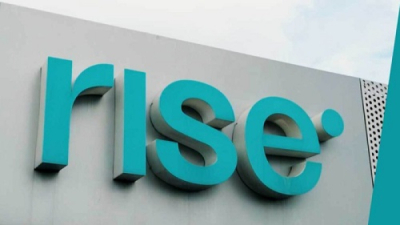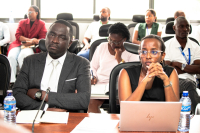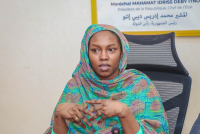- Kenza Lahlou co-founded Outlierz Ventures to fund early-stage African tech startups.
- The firm invests from launch phase through pre–Series A rounds.
- Portfolio companies include PayTic, Kashier and Socium.
Kenza Lahlou directs investment toward early-stage African technology startups through Outlierz Ventures, the firm she co-founded and manages, positioning innovation as a catalyst for economic transformation while backing entrepreneurs from the idea stage onward.
Founded in 2017, Outlierz Ventures focuses on startups that use technology to transform key sectors of the African economy. The firm aims to back founders who tackle structural challenges while shaping the continent’s long-term growth trajectory.
The firm invests at a very early stage, often during the launch phase when projects remain in their infancy. The firm continues to support companies through subsequent milestones before major fundraising rounds. This approach allows the firm to influence strategic decisions at formative stages.
Outlierz Ventures provides capital, operational guidance and access to a professional network. The firm seeks to help founders navigate African market realities and accelerate expansion. Portfolio companies include PayTic, Kashier and Socium.
Before launching Outlierz Ventures, Lahlou co-founded StartupYourLife in 2014 and served as chief executive officer until 2018. The nonprofit identifies, connects and supports seed and early-stage startups in Morocco.
Lahlou graduated from INSA Rouen Normandie in 2010 with a bachelor’s degree in computer science. She earned a master’s degree in strategy and international business management in 2011 from ESSEC Business School in Singapore.
She began her career in 2009 at Xerox Research Centre Europe as product manager and quality controller. She joined the Singapore Agency for Science, Technology and Research in 2011 as strategy consultant. Later that year, she joined Attijariwafa Bank in Morocco as financial analyst.
In 2012, she became strategy and business development specialist at AVISE Partners, a U.S.-based advisory firm focused on financing. Between 2013 and 2014, she served as head of Africa partnerships at Viadeo, a French company specializing in recruitment-related services.
This article was initially published in French by Melchior Koba
Adapted in English by Ange J.A de Berry Quenum
- Sirius Skills launched in 2025 to address Ghana’s digital skills gap.
- The platform offers employer-aligned programs in data analysis, project management and digital fundamentals.
- Founder Ariel Garraway says the model emphasizes hands-on deliverables and direct employer engagement.
Sirius Skills has launched an online learning platform that targets Ghana’s widening digital skills gap as labor market demand outpaces supply.
Founder Ariel Garraway launched the startup in 2025 to bridge the divide between traditional education systems and evolving employer requirements.
The platform offers structured training programs that address current market needs. The curriculum focuses on high-demand fields such as data analysis, project management, leadership and foundational digital skills.
Sirius Skills differentiates itself through a practical learning model. The platform prioritizes deliverables and job-ready competencies over purely theoretical instruction. Learners complete applied projects throughout their training, which supports professional integration or career progression.
“Learners also participate in a structured community environment that reinforces accountability and collaboration. This setup mirrors real-world working conditions and helps employers assess readiness beyond technical knowledge alone.” Garraway said.
The company also positions the platform as a bridge between employers and available talent. Sirius Skills works with companies to identify internal skills gaps and designs tailored learning pathways. The company says this approach reduces onboarding costs and strengthens organizational innovation capacity.
“We are actively conducting interviews with employers across Ghana to align our training program with the skills they are looking for. Our training is designed to meet real recruitment expectations,” the startup said.
African and global economies are accelerating digital transformation efforts. Sirius Skills seeks to address one of the sector’s most pressing constraints: building a workforce that meets current and future technology market demands.
This article was initially published in French by Adoni Conrad Quenum
Adapted in English by Ange J.A de Berry Quenum
Egyptian e-commerce platform Breadfast has raised $50 million in pre-Series C funding from regional and international investors, including Mubadala Investment and SBI Investment. The funds will be used to strengthen its logistics infrastructure and support expansion into new African markets. Originally launched as a bread delivery service, the company has since diversified into groceries, pharmacy products and payment services.
Nigerian fintech Risevest, which enables users to invest in dollar-denominated assets, has secured a fund and portfolio management license from Nigeria’s Securities and Exchange Commission (SEC). The license was issued to its subsidiary, RV Fund Management, following months of regulatory review. The approval resolves uncertainty stemming from a 2025 public warning by the regulator over the company’s unlicensed status.
Applications are now open for the tenth edition of the App Africa Challenge, themed “Tech for a Cleaner World.” The competition is open to Francophone African entrepreneurs with high-potential digital projects. Candidates have until Saturday, February 28, 2026, to apply on the official App Africa Challenge website.
- Internet shutdowns cost sub-Saharan Africa $1.11 billion in 2025, according to Top10VPN.
- Governments imposed 24,276 hours of disruptions, affecting 116.1 million users across the region.
- The Democratic Republic of Congo, Sudan, and Cameroon recorded the highest economic losses.
Internet shutdowns and platform restrictions cost sub-Saharan Africa $1.11 billion in 2025, according to the Global Cost of Internet Shutdowns report published by Top10VPN. Globally, such disruptions generated $19.7 billion in losses, highlighting a growing scale of digital interference.
In sub-Saharan Africa, 2025 losses declined from $1.56 billion in 2024, but the financial impact remained significant. Authorities enforced shutdowns for 24,276 hours, and the disruptions affected 116.1 million internet users. Governments implemented most restrictions during elections, protests, school examinations, and military coups.
Most affected countries
The Democratic Republic of the Congo recorded the highest losses in Africa, with $67.2 million in economic damage. Authorities disrupted connectivity for 1,008 hours, affecting 34.7 million users.
Sudan reported $66.6 million in losses over 2,148 hours of shutdowns, despite affecting a smaller number of users estimated at 14.9 million. The duration of the interruptions amplified the economic impact.
Cameroon incurred $40.5 million in losses, as authorities disrupted access for 52 hours, affecting 12.6 million users.
Governments frequently targeted social media platforms such as Twitter, Telegram, TikTok, Facebook, and WhatsApp. Authorities used these restrictions to limit communication, commerce, and access to information. In some cases, governments imposed intentional slowdowns that made multimedia content and live broadcasts nearly inaccessible.
How are these losses calculated?
The report said analysts calculated the economic cost of shutdowns using the Netblocks Cost of Shutdown Tool, developed by Netblocks and based on a methodology designed by the Brookings Institution, adapted for sub-Saharan Africa.
Analysts estimated losses using digital GDP, disruption duration, and the number of affected users. Researchers sourced data from the World Bank and official government statistics. The report said analysts applied social media restrictions to the entire internet user base because platform bans disrupt overall access, including for users who do not actively use blocked services.
A major obstacle to digital transformation
These losses illustrate the economic cost of internet shutdowns across sub-Saharan Africa. As governments invest in digital transformation to close development gaps, deliberate connectivity disruptions continue to undermine innovation and competitiveness.
Shutdowns also reduce revenues for telecom operators, digital-dependent businesses, and households, and they limit growth potential in an increasingly connected global economy.
In a statement published in January 2026, UNESCO said access to the internet represents a pillar of freedom of expression and a core component of democratic participation. The organization urged governments to adopt policies that promote connectivity rather than impose restrictions.
Samira Njoya
- South African entrepreneur Bonga Lamula co-founded Beqy.ai to automate corporate financial management.
- Founded in 2023, Beqy.ai uses artificial intelligence to centralize accounting, reporting, and financial forecasting.
- The platform targets executives and finance professionals seeking real-time, reliable financial data for faster decision-making.
Bonga Lamula is a South African entrepreneur and an expert in artificial intelligence and digital transformation. He serves as co-founder and chief executive officer of Beqy.ai, an online platform that helps companies manage their finances by automating accounting processes and financial monitoring.
Founded in 2023, Beqy.ai aims to transform how companies track revenues, expenses, and forecasts. The platform seeks to provide executives and finance professionals with continuous access to reliable data in order to support rapid decision-making and reduce risks linked to weak financial visibility.
Beqy.ai centralizes several core functions within a single interface, including transaction tracking, report preparation, analysis, and forecasting. The platform automates the production of monthly financial reports and key performance indicators, which reduces manual workloads and limits human error.
The solution also offers dashboards that allow companies to visualize performance, identify trends, and quickly detect risk signals such as rising costs or declining cash flow. The platform integrates analytical tools that help users understand changes in revenues, expenses, loan repayments, and other significant financial movements.
Bonga Lamula earned a bachelor’s degree in commerce in 2013 and a bachelor’s degree in economics in 2014 from the University of Zululand. He later obtained a master’s degree in finance in 2023 from Corvinus University of Budapest.
He completed a risk analyst internship in 2015 at the South African Reserve Bank. He then joined Bank of America Merrill Lynch in South Africa in 2016 as an investment strategist.
From 2017 to 2020, he worked at Anheuser-Busch InBev, where he successively held roles as supply projects specialist, Africa procurement manager, and digital transformation manager. From 2022 to 2024, he served as digital transformation manager at Tesco Business Solutions in Budapest.
This article was initially published in French by Melchior Koba
Adapted in English by Ange J.A de Berry Quenum
- Burundi launched a web-based single window to manage import permits and online payments.
- The platform integrates pharmaceutical controls through the ABREMA module and connects multiple regulators.
- Authorities made the system mandatory as part of customs and public-sector digital reforms.
The Burundi Revenue Authority (OBR), with support from TradeMark Africa and the United Nations Conference on Trade and Development, presented the new web-based version of the Electronic Single Window for import permit management on February 17, in Bujumbura.
The system now includes the ABREMA module, which covers pharmaceutical and medical products.
Ce mardi 17 février 2026, l’@OBR_BI a procedé à la mise en production et exploitation definitive du module web #ABREMA, une plateforme numérique dédiée à la facilitation de l’importation des produits médicamenteux via le guichet unique électronique.https://t.co/JFCxqmPTRx pic.twitter.com/grqyGfB9gU
— Office Bdais des Recettes (@OBR_BI) February 17, 2026
The platform allows importers and exporters to submit applications, track file progress in real time, and complete payments online without physical travel. The system operates as an integrated platform that centralizes procedures with the Burundian Medicines and Food Regulatory Authority, which oversees pharmaceutical quality and compliance, the Ministry of Environment, Agriculture, and Livestock for sanitary and phytosanitary certifications, and the OBR for final authorization clearance.
The platform features an interactive dashboard that enables users to monitor application status at any time and automatically calculate fees, including options for foreign-currency payments.
Authorities aligned the modernization with Burundi’s public-sector digital transformation policy, which seeks to shorten administrative delays, strengthen trade traceability, and enhance national competitiveness. The reform also extends ongoing efforts to integrate the single window with the ASYCUDA customs system as part of the transition toward a Single Customs Territory.
Authorities made use of the platform exclusive, and all pharmaceutical importers must now complete procedures through the electronic system.
The digital single window also improves coordination between regulatory agencies and businesses while supporting reforms aimed at integrating Burundi into a regional single customs territory. Countries such as Rwanda, Kenya, Uganda, and Zimbabwe also operate electronic single windows interconnected with online customs systems.
The ASYCUDA WORLD system, developed with UNCTAD support, operates in more than 100 economies and helps reduce customs clearance times and administrative costs.
This article was initially published in French by Samira Njoya
Adapted in English by Ange J.A de Berry Quenum
- South African entrepreneur Jason Van Dyk co-founded Sociable to promote in-person social experiences.
- The mobile app helps users find, organize, and host local events and community activities.
- The platform launched publicly in Durban in 2022 after being founded in 2020.
Jason Van Dyk operates as a South African entrepreneur. He co-founded and leads Sociable, a mobile application dedicated to events and communities. The platform helps users find, organize, and experience real-world activities with people around them.
Founded in 2020 and publicly launched in Durban in 2022, Sociable aims to simplify access to activities and outings while encouraging authentic connections through shared experiences. The application targets users who want to attend events, build communities, or meet people with similar interests.
The platform operates through a live activity feed that highlights events and activities near the user or in selected locations. The feed prioritizes what happens “here and now,” and it filters out outdated or overly theoretical content to focus exclusively on accessible, real-life experiences.
Beyond event discovery, Sociable allows users to create and manage their own events. Hosts define each event’s identity by adding a title, a clear description, and visual elements that convey the atmosphere and tone of the proposed experience.
Jason Van Dyk graduated from IIE Varsity College in 2018 with a bachelor’s degree in business administration and management. After graduation, he joined Polar Star Management in 2019 as a junior strategy analyst. He later joined Alliance Enterprise Consulting the same year, where he worked as an SAP consultant until 2022.
This article was initially published in French by Melchior Koba
Adapted in English by Ange J.A de Berry Quenum
- Chad opened talks with Azerbaijan to digitalize transport services and infrastructure.
- Discussions covered e-documents, smart traffic management, and airport digital platforms.
- Authorities kept the partnership at the discussion stage while technical work continued.
The Chadian government explored a partnership with Azerbaijan to accelerate transport sector digitalization. The agenda dominated a meeting held on Monday, February 16, between Boukar Michel, Minister of Digital Economy, and Fatima Goukouni Weddeye, Minister of Transport, who received an official Azerbaijani delegation on mission in Chad.
The talks focused on several strategic priorities for the sector. The discussions covered the digitalization of transport documents and services, the deployment of intelligent road traffic monitoring and management systems using geolocation, and the modernization of airport platforms through integrated digital solutions. Both sides also examined advanced control, alert, and surveillance systems to strengthen security and improve operational performance.
According to Chadian authorities, “the Azerbaijani delegation presented proven technological solutions adapted to national realities and capable of effectively supporting the digital transformation of Chad’s transport sector.”
This rapprochement formed part of a broader framework to strengthen cooperation between Chad and Azerbaijan on digital transformation, which began in late January 2026 with the signing of two memorandums of understanding. Boukar Michel said the initiative aligned with the national digital transformation strategy, which aims to improve public service quality, increase transparency and administrative efficiency, strengthen the security of strategic infrastructure, and stimulate innovation and economic attractiveness.
In the transport sector, the supervising ministry had already announced, in September 2025, the launch of a large-scale project to digitalize its financially oriented administrative services. The project plans to deploy an integrated digital system that centralizes all services, including vehicle registration cards, driving licenses, transport licenses, accreditations, and the mandatory waybill.
Authorities said the proposed cooperation between Azerbaijan and Chad on transport digitalization remained at the discussion stage. However, officials said technical work would continue to identify priority projects, define a clear operational framework, and establish an implementation timeline.
This article was initially published in French by Isaac K. Kassouwi
Adapted in English by Ange J.A de Berry Quenum
More...
African startups led by young women are invited to apply for the AI Ventures Accelerator, a free 12-week program aimed at supporting early-stage ventures. Selected teams will receive technical and business training and may qualify for up to $10,000 in equity-free seed funding. Applications close on Sunday, February 22.
The Government of Burundi is hosting the 2025 Central Africa Internet Governance Forum in Bujumbura. The event, which began on Monday, February 16, and concludes on Saturday, February 21, centers on the theme of “Digital Technology: A Catalyst for Innovation, Inclusion and Resilience in Central Africa.” Key topics on the agenda include expanding digital access, strengthening digital sovereignty, and closing the digital divide.
On Wednesday, March 11, Nairobi will host the 26th Connected Banking Summit, bringing together banks, fintech startups, regulators and technology companies to advance the transformation of East Africa’s financial services sector. The summit will focus on payment interoperability, fraud prevention, AI, digital identity and cross-border payments. The event will also feature an awards ceremony recognizing industry initiatives.
- Senegal signed a partnership to organize Efest Africa, an international gaming and esports event in Dakar.
- The national video game market reached an estimated CFA49 billion ($88.5 million) with about 1.7 million regular players in 2025.
- Authorities aim to position Dakar as a regional innovation hub under the government’s New Technological Deal strategy.
Senegal moved to structure its gaming ecosystem by signing a partnership agreement to organize Efest Africa, an international event dedicated to gaming, esports, technological innovation and digital transformation.
The Senegalese Gamers Association and the Ministry of Communication, Telecommunications and Digital Affairs signed the agreement on Friday, February 13 in Dakar. The agreement defines the framework for preparing the event and sets objectives to strengthen the country’s positioning as an emerging technology hub in Africa.
New Deal Technologique 🇸🇳
— New Deal Technologique (@LeNewDeal) February 14, 2026
Le 13 février 2026, le Ministre Alioune SALL a signé les conventions avec les partenaires de la 3e cohorte.
Une nouvelle étape pour accélérer la transformation numérique, soutenir l’innovation et étendre le digital sur tout le territoire.#Innovation pic.twitter.com/H8BKrz61vn
Alioune Sall attended the signing and said the cooperation framework aims to reinforce Senegal’s technological profile on the continent. The agreement covers the design, promotion and organization of the event. The partners seek to showcase public and private initiatives, promote local startups, attract international investors and boost youth employability in digital and gaming sectors.
The initiative aligns with the government’s strategy to position Dakar as an African innovation pole under the New Technological Deal. The event will facilitate networking among entrepreneurs, mentors, institutions and partners. Under the agreement, SENGAMES will coordinate the project, mobilize partners and oversee the communication strategy, while the ministry will provide institutional backing, technical support and participation in governance bodies.
The signing comes as gaming emerges as a growing segment of Senegal’s digital economy. A 2025 study published by SENGAMES estimated the national video game market at about CFA49 billion ($88.5 million), including spending on games, microtransactions and connectivity. The study estimated that Senegal counts around 1.7 million regular players, or nearly one in ten inhabitants.
In this context, initiatives such as Efest Africa aim to further structure the national ecosystem, promote local content creation and attract investment into a sector that remains nascent but expands rapidly.
At the continental level, gaming and esports growth relies on a young and connected population and improved access to mobile internet. According to game publisher Carry1st and research firm Newzoo, Egypt, Nigeria and South Africa dominate Africa’s gaming market and account for more than half of its total value, driven by rapid smartphone adoption and improved connectivity.
This article was initially published in French by Samira Njoya
Adapted in English by Ange J.A de Berry Quenum















